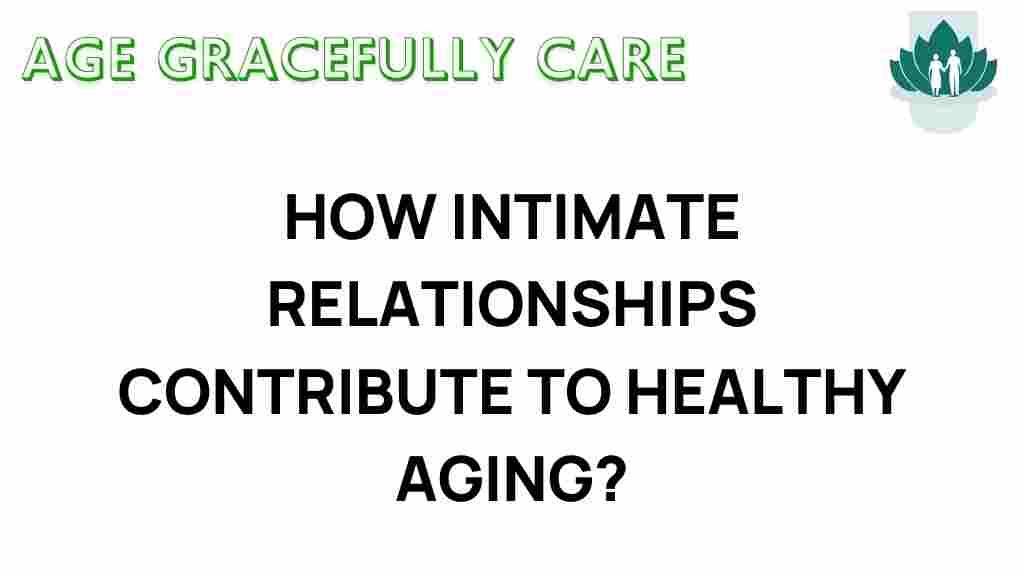Unveiling the Link: How Intimate Relationships Foster Healthy Aging
As we navigate the journey of life, the importance of healthy aging cannot be overstated. Healthy aging is not merely the absence of disease but encompasses a holistic approach to physical, emotional, and social well-being. One significant aspect that plays a crucial role in promoting healthy aging is the presence of intimate relationships. These connections not only enhance our emotional health but also contribute to our overall wellness, mental well-being, and longevity. In this article, we will explore how intimacy and relationships are intertwined with healthy aging and the myriad benefits they bring to our lives.
The Impact of Intimacy on Health
Intimacy in relationships goes beyond physical closeness. It involves emotional bonding, understanding, and mutual respect. Studies have shown that individuals in intimate relationships tend to experience:
- Lower Stress Levels: Emotional support from loved ones can mitigate stress and anxiety.
- Improved Physical Health: Intimacy often leads to better health behaviors, such as exercising together and maintaining a healthy diet.
- Enhanced Immune Function: Positive relationships can bolster the immune system, making individuals less susceptible to illness.
Intimate Relationships and Emotional Health
Emotional health is a cornerstone of healthy aging. Intimate relationships provide a safe space for individuals to express their feelings, share their thoughts, and seek comfort. Here’s how these relationships contribute to emotional well-being:
- Reduced Feelings of Loneliness: Strong social connections help combat loneliness, a significant risk factor for mental health issues.
- Increased Happiness: Sharing life experiences with others fosters joy and contentment.
- Emotional Resilience: Supportive relationships enable individuals to cope better with challenges and setbacks.
Building and Maintaining Intimate Relationships
Creating and sustaining intimate relationships requires effort and commitment. Here’s a step-by-step process to nurture these connections:
1. Prioritize Communication
Open and honest communication is vital for building intimacy. Make time for regular conversations, and practice active listening.
2. Spend Quality Time Together
Engage in activities that both partners enjoy. This can be as simple as cooking together, going for walks, or exploring new hobbies.
3. Show Appreciation
Express gratitude for your partner’s contributions to your life. Acknowledging their efforts strengthens emotional bonds.
4. Foster Trust
Trust is the foundation of any intimate relationship. Be reliable, keep promises, and be honest to cultivate a trusting environment.
5. Seek Professional Help if Needed
If challenges arise, consider seeking guidance from a relationship counselor. Professional support can provide valuable tools for improvement.
The Role of Social Connections in Healthy Aging
Beyond intimate partnerships, broader social connections also impact healthy aging. Engaging with friends, family, and community members enhances overall wellness. Here’s how:
- Social Support Networks: Having a diverse support network can provide emotional and practical assistance during difficult times.
- Increased Engagement: Social interactions stimulate cognitive functions and keep individuals mentally sharp.
- Longevity: Research indicates that strong social ties are linked to a longer lifespan.
Intimacy and Mental Well-Being
Mental well-being is a crucial aspect of healthy aging. Intimate relationships significantly enhance mental health through:
- Reduced Depression Rates: Individuals in loving relationships often report lower levels of depression due to emotional support.
- Improved Coping Skills: Having a partner to share life’s challenges with can lead to better coping mechanisms.
- Enhanced Cognitive Function: Engaging in stimulating conversations and activities with a partner can improve cognitive health.
Challenges in Maintaining Intimacy
While the benefits of intimate relationships are clear, maintaining these connections can be challenging. Here are some common issues and troubleshooting tips:
1. Time Constraints
With busy schedules, it can be hard to find time for intimacy. Consider scheduling regular date nights or quality time together.
2. Communication Breakdowns
Misunderstandings can lead to conflict. Practice active listening and clarify any points of confusion to maintain open lines of communication.
3. Different Love Languages
People express love in different ways. Understanding your partner’s love language can help bridge gaps and enhance emotional connection.
4. Stress and External Pressures
Life stressors can impact relationships. Make it a priority to support each other during difficult times, reinforcing your bond.
External Resources for Relationship Wellness
For those looking to strengthen their intimate relationships and overall wellness, numerous resources are available:
Conclusion
In conclusion, the connection between intimate relationships and healthy aging is profound. By fostering intimacy, we not only enhance our emotional health but also contribute positively to our overall wellness, mental well-being, and longevity. Investing time and effort into nurturing these relationships can lead to a happier, healthier life as we age. Embrace the power of intimacy and social connections, and unlock the secrets to healthy aging.
This article is in the category Wellness and created by AgeGracefullyCare Team
